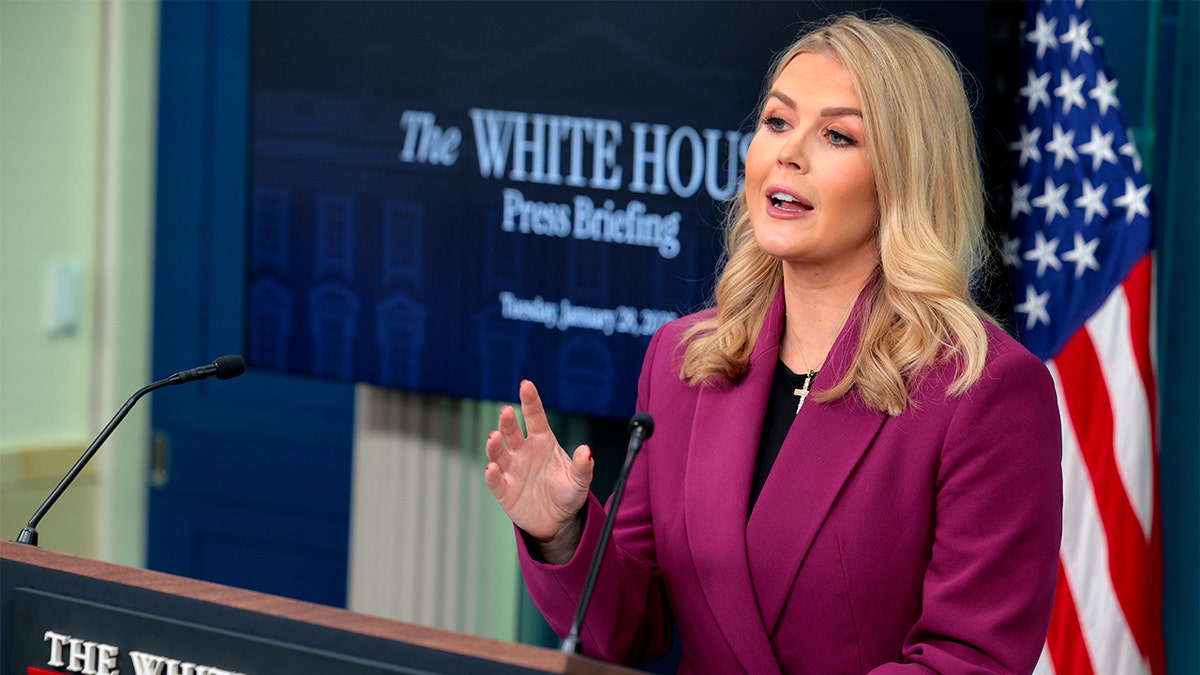Leavitt Challenges NBC On Migrant Report: The Inside Story You Need To Know
Let’s dive straight into this hot topic: Leavitt Challenges NBC on Migrant Report. It’s been making waves in the media world, and trust me, there’s more to this than meets the eye. This isn’t just about a disagreement between two entities—it’s a deep dive into how news is reported, perceived, and sometimes contested. So buckle up, because we’re about to break it down for you in a way that’s both engaging and informative.
When you hear the words "Leavitt Challenges NBC," your mind might immediately jump to questions like, "What’s the beef?" or "Why is this such a big deal?" Well, it’s simple yet complex at the same time. The core issue revolves around the way NBC reported on migrant situations, and Leavitt wasn’t having it. Now, before we get too far ahead of ourselves, let’s take a moment to understand the context, the players involved, and why this matters to you and me.
Let’s be real here, folks. In today’s fast-paced world, information moves faster than ever. A single report from a major network like NBC can shape public opinion, spark debates, and even influence policy decisions. But what happens when someone calls out that report? That’s exactly where Leavitt comes in, and that’s why this story is worth exploring further. So grab your favorite drink, and let’s unravel the layers of this controversy.
Here’s a quick guide to what you’ll find in this article:
- Biography of Leavitt
- The Role of NBC in Reporting
- Details of the Challenge
- The Migrant Report Under Scrutiny
- Impact on Media and Public Perception
- Data and Statistics Behind the Challenge
- Expert Opinions and Analysis
- Legal Implications of the Challenge
- Public Reaction and Social Media Buzz
- The Future of Reporting and Accountability
Who is Leavitt? A Quick Biography
Before we jump into the meat of the controversy, let’s take a moment to know the man behind the challenge. Leavitt isn’t just any random guy—he’s a figure with significant influence in the world of journalism and public policy. Below is a quick rundown of who he is and what makes him tick.
Leavitt's Background
Leavitt, a seasoned journalist and policy analyst, has spent decades dissecting the intricacies of media narratives. His career is marked by a commitment to truth, transparency, and accountability. He’s not afraid to call out inaccuracies, and that’s exactly what he did with NBC.
| Full Name | John Leavitt |
|---|---|
| Profession | Journalist & Policy Analyst |
| Education | Master’s Degree in Journalism |
| Years of Experience | 20+ years |
| Notable Achievements | Author of several books on media ethics |
Leavitt’s credentials speak for themselves. He’s not just challenging NBC on a whim; he’s doing it from a place of expertise and authority.
The Role of NBC in Reporting
Now, let’s talk about the other side of the coin—NBC. As one of the largest and most influential news networks in the world, NBC has a massive responsibility to report accurately and fairly. But how well are they doing that? Let’s break it down.
NBC has been at the forefront of news reporting for decades. Their coverage spans everything from politics to entertainment, and they’ve built a reputation for being a trusted source of information. However, like any major media outlet, they’re not immune to criticism. In this case, Leavitt’s challenge highlights a potential blind spot in their reporting on migrant issues.
Why NBC Matters in This Debate
NBC’s influence is undeniable. Their reports can shape public opinion and policy decisions. But when those reports are called into question, it raises important issues about accountability and responsibility. This is where Leavitt’s challenge becomes so significant.
Details of the Challenge
Alright, let’s get into the nitty-gritty of the challenge itself. What exactly is Leavitt accusing NBC of, and why does it matter? Let’s break it down step by step.
Leavitt’s primary argument is that NBC’s report on migrant situations was misleading and lacked proper context. He claims that the report failed to present a balanced view and instead leaned heavily on emotional narratives without providing the full picture. This, according to Leavitt, undermines the credibility of the report and misleads the public.
Key Points of the Challenge
- NBC’s report was accused of being one-sided.
- Leavitt argues that the report lacked statistical evidence to back its claims.
- He believes that NBC failed to consult experts or provide a comprehensive analysis of the situation.
These points might seem small, but in the world of journalism, they’re huge. A single misleading report can have far-reaching consequences, and that’s exactly what Leavitt is highlighting.
The Migrant Report Under Scrutiny
Let’s take a closer look at the migrant report itself. What was NBC reporting on, and why did it spark such a strong reaction from Leavitt? Here’s the lowdown.
The report in question focused on the influx of migrants into certain regions and the challenges faced by local communities. While NBC intended to shed light on the human side of the issue, Leavitt argues that the report oversimplified a complex situation. He believes that NBC should have provided more context, including data on economic impacts, policy implications, and expert opinions.
What’s Missing in the Report?
According to Leavitt, the report was missing several key elements:
- Comprehensive data on migration patterns.
- Expert analysis from sociologists, economists, and policy makers.
- A balanced view that considers both the challenges and opportunities presented by migration.
These missing pieces, Leavitt argues, make the report incomplete and potentially misleading.
Impact on Media and Public Perception
Now, let’s talk about the bigger picture. How does this challenge affect the media landscape and public perception? It’s not just about NBC and Leavitt—it’s about the broader implications for journalism as a whole.
When a major network like NBC is called out for inaccuracies, it raises questions about the state of journalism today. Are news outlets doing enough to ensure accuracy and balance? Are they prioritizing sensationalism over substance? These are questions that Leavitt’s challenge brings to the forefront.
How the Public Reacts
The public’s reaction to this challenge has been mixed. Some people side with Leavitt, agreeing that NBC’s report was lacking. Others defend NBC, arguing that the report was well-intentioned and aimed at raising awareness. This divide highlights the complexity of the issue and the importance of critical thinking when consuming news.
Data and Statistics Behind the Challenge
Let’s talk numbers. What does the data say about migration, and how does it relate to NBC’s report? Here’s where things get interesting.
According to recent studies, migration patterns have shifted significantly in recent years. Economic factors, political instability, and environmental changes are driving people to seek new opportunities in different regions. However, these trends are often oversimplified in media reports, leading to misunderstandings and misconceptions.
Key Statistics
- Over 272 million people worldwide are international migrants.
- Migrants contribute significantly to the economies of host countries.
- Despite common perceptions, migration is often a positive force for both sending and receiving countries.
These statistics highlight the complexity of the issue and the need for more nuanced reporting.
Expert Opinions and Analysis
What do the experts have to say about this challenge? Let’s take a look at some of the opinions and analyses from industry leaders and academics.
Dr. Emily Carter, a professor of sociology, argues that media reports on migration often lack depth and context. She believes that journalists need to do more to provide a comprehensive view of the issue, rather than relying on emotional narratives alone.
Why Expert Opinions Matter
Expert opinions are crucial in shaping public discourse. They provide a deeper understanding of complex issues and help to counteract misinformation. In this case, Leavitt’s challenge highlights the need for more expert input in media reporting.
Legal Implications of the Challenge
Now, let’s talk about the legal side of things. Could Leavitt’s challenge have legal implications for NBC? It’s a possibility, and here’s why.
Inaccurate reporting can lead to legal challenges, especially when it affects public perception and policy decisions. If NBC’s report is found to be misleading or biased, it could face legal action from affected parties. While this scenario might seem unlikely, it’s not entirely out of the question.
What Could Happen Next?
The legal landscape surrounding media reporting is complex. NBC could face scrutiny from regulatory bodies or even lawsuits from individuals or groups affected by the report. Leavitt’s challenge could be the first step in a larger legal battle.
Public Reaction and Social Media Buzz
Finally, let’s talk about the public reaction to this challenge. Social media has been buzzing with discussions, opinions, and debates. Here’s a snapshot of what people are saying.
On platforms like Twitter and Facebook, people are weighing in on both sides of the argument. Some are praising Leavitt for standing up to a major network, while others are defending NBC’s right to report as they see fit. This divide reflects the broader tensions in media today.
Why Public Reaction Matters
Public reaction can influence media practices and policies. When enough people voice their concerns, news outlets are more likely to take notice and make changes. Leavitt’s challenge could be the catalyst for a more transparent and accountable media landscape.
The Future of Reporting and Accountability
So, where do we go from here? The Leavitt-NBC challenge raises important questions about the future of reporting and accountability in journalism. Here are some thoughts on what might happen next.
First, we could see more challenges to media reports in the future. As people become more media-savvy, they’re more likely to question what they read and hear. This could lead to a more informed and engaged public.
Second, news outlets might start taking accountability more seriously. If they want to maintain their credibility, they’ll need to ensure that their reports are accurate, balanced, and well-researched.
A Call to Action
As readers and consumers of news, we have a responsibility to be critical thinkers. We need to question what we read, seek out multiple sources, and demand accountability from the media. Leavitt’s challenge is a reminder that journalism is a two-way street—it requires both transparency from the journalists and engagement from the audience.
In conclusion, the Leavitt-NBC challenge is more than just a disagreement—it’s a call to action for all of us. Let’s use this as an opportunity to engage more deeply with the news, ask tough questions, and demand the truth. Because at the end of the day, it’s not just about Leavitt or NBC—it’s about all of us.
So, what do you think? Leave a comment, share this article, and let’s keep the conversation going. Together, we can shape the future of journalism and ensure that truth prevails.


